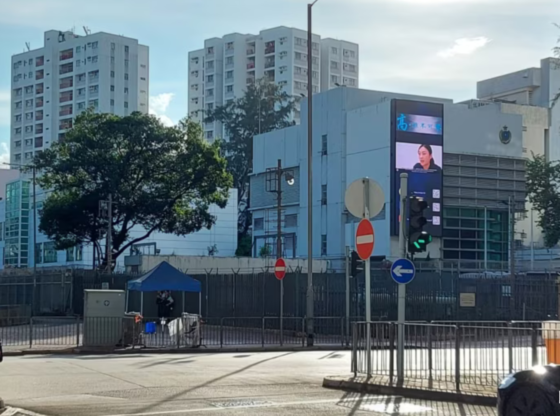HONGKONG-
“Political prisoner” used to be an unattainable term in Hong Kong’s more than 100 years of history. However, since the Hong Kong government took a tough stance in detaining people participating in social movements in 2019, and passed the Hong Kong version of the National Security Law in 2020, sentencing dissidents to prison under the National Security Law, many people suddenly became “political prisoners.”
Today, several years later, some “political prisoners” have been released from prison. However, after returning to society, they found that everything is no longer the same. It is like being moved from a small prison to a large prison. The mental pressure they suffer from both inside and outside is something that outsiders cannot imagine or understand.
The Hong Kong Democracy Council, an organization of Hong Kong people in the United States, released data in May this year, indicating that as of April this year, the number of political prisoners in Hong Kong has increased to 1,841. In addition to the politicians who have been dealt with in a high-profile manner by the Chinese Communist Party government and the Hong Kong government, including Benny Tai, the initiator of the Occupy Central movement, Jimmy Lai, former founder of Apple Daily, Joshua Wong, the secretary-general of Hong Kong Demosisto, and Cardinal Joseph Zen, the retired cardinal of the Hong Kong Diocese of the Catholic Church, there are also opponents from various industries such as journalists, lawyers, and teachers, most of whom are under the age of 25.
Moreover, the situation of “imprisonment before trial” is quite common. For example, Dai Yaoting and others were arrested in February 2021 for violating the National Security Law in the Democratic Party’s Legislative Council primary election. This was called the “47-person case.” The arrested persons have been detained in prison for more than 3 years. Until May this year, 45 of them were found guilty, but they are still in the appeal stage in batches, and even the length of their sentence has not been decided, and they are still nowhere in sight to leave prison.
Suffering mental harassment in prison
Although Zhou Jiafa, the vice chairman of external affairs of the Hong Kong left-wing democratic party Social Democratic Alliance (SDA), has escaped imprisonment, he and other party members who have not yet been prosecuted still insist on setting up street stalls in downtown areas to publicly express their opinions on controversial political issues and sometimes initiate mass movements. For example, on the day when the verdict of the “47 Case” was announced in May, the SDA originally planned to gather outside the court to show support, but Zhou Jiafa and his party members were detained by the government for more than 30 hours. Zhou Jiafa and his party members have experienced such detention at least several times.
Zhou Jiafa was interviewed by Voice of America and revealed that although he was not tortured by the police in the detention room, he was also subjected to a lot of mental hostility. He said: “Most of the time I was detained, I had nothing to do, but they deliberately delayed it. Even the arrest notice of an A4-sized person had to be read at least twice in front of me, which was clearly a delay.
During the detention period, I was worried because I didn’t know whether the authorities would sue me, and if so, what crime I would be charged with. I felt confused. They also restricted my right to communicate with the outside world, as if I was isolated from the world. I was forbidden to seek legal advice and help from relatives and friends. Sometimes I was even detained after being beaten to the point of having bruises all over my body. At that time, I had been strangled with tape for a long time, but the police did not intend to cut it open for me. In addition, the detention room was always lit with bright white lights. Although I could cover my eyes with a blanket, the hygiene of the blanket was something I could judge for myself. “
Zhou Jiafa continued to say that if he saw a police officer on the street now, he would feel uncomfortable because of the unpleasant experience in the detention room, so he could not imagine how much mental damage the party members who had been imprisoned for a long time had suffered.
It is difficult to return to normal life after being released from prison
In addition to mental stress, Hong Kong political prisoners cannot live the lives of ordinary people after being released from prison. They are even imprisoned physically and mentally, just in another way. For example, Chan Ho-wan, the former convener of the Civil Human Rights Front, who is also a member of the League of Social Democrats, was sentenced to 18 months in prison in 2021 for unauthorized assembly and inciting others to participate in unauthorized assembly. He was released in October 2022. However, after being released from prison, he has a criminal record, especially because of his “political crimes”, which has prevented him from finding a full-time job. The landlords are afraid of his background and refuse to rent to him. In order to no longer be affected by political prison in his future life, Chan Ho-wan chose to live a low-key life and declined all interviews from the media. Even if another member of the League of Social Democrats, Wong Ho-ming, obtains an insurance practitioner license and becomes a “professional”, no insurance company is willing to hire him. As for Liu Jiadong, an independent social worker involved in the social movement case, he could no longer gain a foothold in the social welfare sector after being released from prison. He could only serve as an independent to assist released prisoners who were also affected by political imprisonment to reintegrate into society. However, when a VOA reporter wanted to contact Liu Jiadong, he refused to be interviewed due to “force majeure.”
Former web radio host, nicknamed “Jess”, was sentenced to 32 months in prison for sedition and money laundering for his remarks on a web radio program, such as “Former Chief Executive Carrie Lam’s whole family must die”. After being released from prison, “Jess” said that Hong Kong was his home and he had no intention of emigrating, but he soon found that Hong Kong could no longer accommodate him. For example, he was followed and monitored by three groups of people every day, and he couldn’t even open a bank account, so he finally decided to move to Canada. His former web radio partner, current affairs commentator Sam Pu, who has now moved to Taiwan, admitted that although “Jess” has moved away from the place of right and wrong, his heart has been hurt by the political prison. He told VOA: “He suffered from insomnia for a while and had nightmares that reminded him of many things in the past. These symptoms still occur intermittently, and he even has to receive psychological counseling. The greatest mental damage he suffered while in prison was that he didn’t know how long he would be imprisoned. It was not until a month before his release that he was told that he would be released the next month. Fortunately, I see that the old him is still there, still daring to speak out against injustice, and has not been worn down by the calamity of prison.”
The government intends to catch all
Some analysts will compare the political prisons after 2019 with the situation in Hong Kong where the British Hong Kong government imprisoned leftists in 1967. However, Sang Pu sternly refuted these arguments. The main reason is that the “1967 Riots” was an extension of the CCP’s Cultural Revolution, which is completely different from what the anti-extradition bill movement after 2019 pursues. Moreover, the Hong Kong British government at that time and the current SAR government have very different methods of dealing with dissidents. He said: “The Hong Kong British government stopped at the point, but the CCP regime wants to catch them all. The Hong Kong British government will only arrest a small number of people, and will not set up a complete plan to carry out rectification work. Moreover, the Hong Kong British government sentenced the rioters of that year to no more than 3 years. On the contrary, the defendants in the “47 Case” alone were detained for more than 3 years without trial. More protesters may face 10, 20 or even life imprisonment.”
In recent years, the Hong Kong government has continuously arrested and imprisoned dissidents for political reasons. Many analysts have pointed out that this has caused great harm to the entire society. Chung Kin-wah, former assistant professor of the Department of Applied Social Sciences at the Polytechnic University and former deputy chief executive of the Hong Kong Public Opinion Research Institute, frankly stated that unless the government can successfully reform the political prisoners’ thoughts during the imprisonment process, even if they admit their mistakes after being released from prison, they will still be unwilling to accept it in their hearts. Moreover, many of them are professionals, and it is difficult to unite and recruit them. As for why the Hong Kong government has been so active in creating political prisoners in recent years, Chung Kin-wah believes that both the Chinese Communist Party government and the SAR government are doing it intentionally.
“Beijing may give some instructions or strategic suggestions to the SAR government. As for who to shoot, the SAR government has room for discussion. How much they want to do depends on what personal goals they want to achieve. People in the SAR government’s governing team often have to publicly express their loyalty, and even speak harsher than Communist Party cadres, because they believe there is no harm in saying it, and the Chinese Communist government will not refute it. Instead, there is a chance to attract the attention of the Chinese Communist government,” he said.
Zeng Jianyuan, chairman of the Taiwan Chinese Democratic Academy Association, who has done in-depth research on the Hong Kong issue, used the experience of political prisoners in Taiwan during the KMT’s authoritarian era as an example to infer the future situation in Hong Kong. He told VOA: “The KMT government set many restrictions on political prisoners in terms of rehabilitation, especially re-employment. They would also send their political files to wherever the political prisoners were employed, making many organizations afraid to hire them. In addition, their relatives would keep their distance from them to avoid being investigated by the authorities or being dragged down if they knew about the situation but didn’t report it. These interpersonal isolations bring greater psychological harm than isolation in the workplace. Fortunately, there were several companies at the time, such as Formosa Plastics and Tatung Corporation, that provided a lot of help to political prisoners.”
Zeng Jianyuan went on to say that compared to the political prisoners in the authoritarian era who were deserted by their friends and relatives, Hong Kong people generally have more sympathy and respect for the political prisoners who have been imprisoned in recent years for their pursuit of democracy and freedom. If relatives, friends and society can give more support to political prisoners, it will help resolve the instability brought about by the political prisoners’ dissatisfaction with society and the government.

